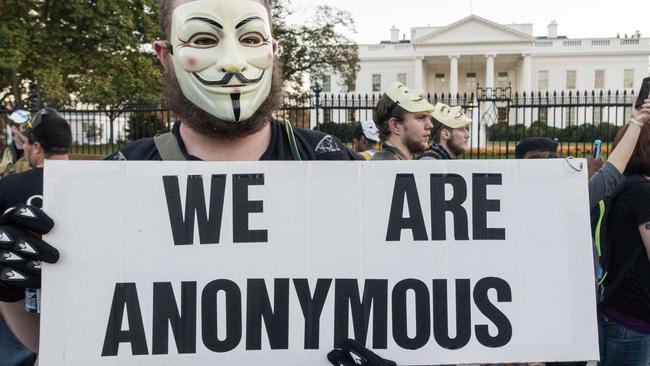Ghost Security Group claims Anonymous’s tactics are not working
ANONYMOUS set out to utterly destroy IS, but its campaign might be backfiring. A breakaway group claims it has a better plan.

THEY claimed they had “taken down” about 20,000 Twitter accounts associated with Islamic State in response to the Paris attacks, which claimed 130 lives.
But the tough talk by hacktivism group Anonymous is being called into question with reports many of the names it wiped from the Twittersphere were not even related to the militant terror group.
Adding to the doubt are reports the folks at Twitter don’t hold the #OpIsis campaign created by Anonymous in high regard.
Members of the collective have compiled lists of Twitter accounts it claims are associated with IS then posted them online.
But the social media company, which hasn’t viewed the files directly, claims they are “wildly inaccurate”.
“Users flag content for us through our standard reporting channels, we review their reports manually, and take action if the content violates our rules,” a Twitter spokesman told the Daily Dot. “We don’t review anonymous lists posted online, but third party reviews have found them to be wildly inaccurate and full of academics and journalists.”
Since Anonymous launched its campaign, it has been accused of seeking publicity, and of doing more damage than good.
It has also been accused of overstating what it has actually done.
In the days after it launched #OpIsis, Anonymous claimed it had thwarted another terror attack.
It says through the course of its “work” it found information about further planned attacks in the US and France and claims to have passed this information on to authorities.
One of the so-called targets was a WWE wrestling event in Atlanta on Tuesday, according to Ars Technica.
The FBI has reportedly discounted the claims and released a statement saying it did not have “specific or credible information of an attack at this time”.
Doubts have also been cast about whether #OpIsis has even been effective after it emerged the terror group was primarily using the encrypted messaging service Telegram to communicate with recruits. The company issued a statement last week saying it had blocked 78 accounts believed to be linked to Islamic State.

And while Anonymous says it will continue with its plans to destroy Islamic State online, another hactivist group has emerged claiming it is taking a much different approach to its predecessor.
A small group of disgruntled hackers, fed up with the “unsophisticated” tactics used by Anonymous, have formed their own troupe, Ghost Security Group.
The members claim to have counter-terrorism experience, live in the US, Europe and the Middle East and say they operate like spies rather than hackers.
They say rather than trying to shutdown ISIS accounts or flooding their sites with so much traffic it becomes overloaded, it just monitors them then reports suspicious activity to authorities.
Ghost Security Group also claims it too foiled another terror attack, but says it was one that was planned for Tunisia.
The BBC reported it was unable to verify this claim.
“They [Anonymous] don’t have any counter-terrorism experience whatsoever,” Ghost Security Group’s executive director, who did not want to be named, told the BBC. “We felt that not enough was being done and the Charlie Hebdo attack made it clear that ISIS was not confined to the Middle East.
“We would much prefer to stop attacks than shut down websites.
“I don’t think DDoS (distributed denial of service) attacks do a huge amount of damage to Islamic State. Anonymous are hitting some extremist forums that have intelligence value, but we would like forums to stay online so we can see what people are saying and gather intelligence from them.”
However not everyone in the hacking community has embraced GSG, with some questioning its relationship with authorities.
But the director told the BBC by working with law enforcement such as those in the US government was a trade-off worth making.
“We have data,” the director said. “We can’t do anything with that data unless we work with the US government. They have the guns and the boots on the ground, they can disrupt terrorist operations.”
The news comes as another innocent victim has fallen at the hands of the ongoing cyberwar between hacking groups and Islamic State.
Aaron Zelin, operator of Jihadology - a website with the sole purpose of tracking militant groups and translating their propaganda - claims his website was victim to a distributed denial-of-service (DDoS) attack earlier this week.
“All I know is that I had a difficult time loading or [was] unable to load my website,” he told Tech Insider.
“I have gotten similar complaints from others.”
Following the attack, Mr Zelin took to twitter to call out all hacktivism groups for the attacks on his website.
Dear Anonymous, GhostSec, and any other “hackers,†stop doing DDoS attacks against my website @Jihadology_Net. You are impeding research.
— Aaron Y. Zelin (@azelin) November 23, 2015The tweet came to the attention of hacking collective Ghost Security, but it denied any involvement.
However, Mr Zelin responded with a screen capture taken from Ghost Security’s website showing at least 60 reports of content from the website.
@GhostSecPI @vadodimio @azelin @TorReaper Okay cool, thanks! Maybe it’s anon then. Though this is on your site. pic.twitter.com/Tr4zWVQfKa
— Aaron Y. Zelin (@azelin) November 24, 2015The hacking collective said it would explore the issue further.



